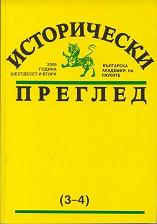Българският външен дълг през Втората световна война (1939-1945)
Bulgaria's Foreign Debt during the Second World War (1939-1945)
Author(s): Martin Ivanov, Daniel VachkovSubject(s): History
Published by: Институт за исторически изследвания - Българска академия на науките
Summary/Abstract: The years of World War Two may be assessed as successful for the policy of the Bulgarian State regarding the solution of the foreign debt problem. Making use or the specific political and economic conditions created by the large-scale conflict, the Governments of G.Kyosseivanov, B. Filov and D. Bozhilov not only did not allow a foreign debt increase but as a result of buying a considerable number of bonds of pre- and post-war loans at advantageous prices or through direct clearing agreements, a marked reduction of the debt in absolute value was achieved. For instance the size of the foreign debt at the end of 1929, without including the reparations and occupation obligations, came up to 16,800 million leva in paper money, and at the end of World War Two it amounted to 12,500 million paper leva. The main cause for these favourable results was the fact that the country up to the autumn of 1944 did not participate in active combat operations which made it possible for it to preserve its economic and financial potential and to meet all additional expenditure by the state budget funds, without resorting to external financing. The correct policy to bind the payments under the loans with the actual export of Bulgarian goods led both to easing the debt service and to winning new positions for Bulgarian products on the foreign markets.
Journal: Исторически преглед
- Issue Year: 2001
- Issue No: 3-4
- Page Range: 92-116
- Page Count: 25
- Language: Bulgarian
- Content File-PDF

